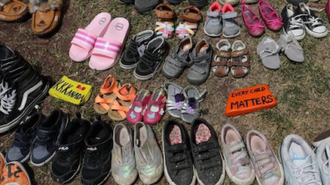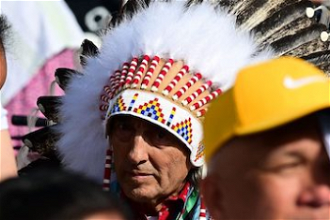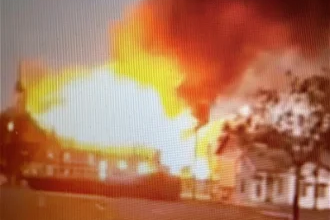Canada: More graves found linked to Catholic schools

Image IRSC Canada
The discovery of 751 unmarked graves near a former Catholic-run school in Saskatchewan has increased pressure on the Vatican to offer a formal apology to Canada's First Nation population. Indigenous leaders warn as many as 6,000 children may have died as a result of mistreatment in the Indian Residential School System.
The Canadian Prime Minister, Justin Trudeau, continues to call on Pope Francis to issue an apology and to ensure that records are made available.
The Cowessess First Nation indigenous tribe used ground-penetrating radar to locate the Saskatchewan remains. It is not clear how many of the bodies are those of children who attended the nearby Marieval Indian Residential School, which was operated by the Catholic Church between 1899 and 1997. The Saskatchewan discovery follows the identification of a mass grave in British Columbia in May.
Representatives of the Canadian Conference of Catholic Bishops have repeatedly expressed their sorrow following the discovery of the graves. The Archbishop of Toronto, Cardinal Thomas Collins, told the CBC that local dioceses have apologised and are making records available. He described as "unhelpful" Trudeau's hint that the government may be prepared to take the church to court.
Financial consequences
Michael Coren, a commentator on religious affairs, told the CBC that the Catholic church was not solely to blame for the mistreatment of indigenous children. However, Anglican and Presbyterian authorities had apologised for their record running the schools, while the Vatican declines to apologise. Coren suggested that lawyers have warned that there will be enormous legal consequences if there is an admission of responsibility. He counselled the Vatican to acknowledge public anger in Canada and to apologise, notwithstanding the financial penalties. Coren argued that the Catholic church operates in a centralised manner and with one voice when it refuses to accept married men becoming ordained or same-sex marriage, rather than devolving policy-making. He also pointed out that the Vatican had previous apologised for its role in the colonial conquest of Latin America.
Financial consequences
Michael Coren, a commentator on religious affairs, told the CBC that the Catholic church was not solely to blame for the mistreatment of indigenous children. However, Anglican and Presbyterian authorities had apologised for their record running the schools, while the Vatican declines to apologise. Coren suggested that lawyers have warned that there will be enormous legal consequences if there is an admission of responsibility. He counselled the Vatican to acknowledge public anger in Canada and to apologise, notwithstanding the financial penalties. Coren argued that the Catholic church operates in a centralised manner and with one voice when it refuses to accept married men becoming ordained or same-sex marriage, rather than devolving policy-making. He also pointed out that the Vatican had previous apologised for its role in the colonial conquest of Latin America.
In a 2007 agreement, the Catholic church in Canada was obligated to give $25m under the Indian Residential School Settlement. However, only $3.7m has been raised. The Canadian government has pledged to give former daytime students and their offspring $10,000 compensation each in recognition of the harm suffered under the school system, following a 14-year legal battle. This comes in addition to a $50m Day Scholar Revitalization Fund to contribute to the healing of psychological wounds, the support the reclaiming of language and culture.
Backlash
On June 21st, two Catholic churches on traditional indigenous land in British Columbia were destroyed in what is believed to be arson attacks. In a poll, two thirds of Canadians said the church should bear responsibility, whereas 34per cent place the majority of blame on the Canadian government of the day. 80per cent of respondents said they were ashamed and believed the recent revelations were the tip of the iceberg.
Several cities are in the process of removing statues of previously revered figures who were implicated in the Indian residential Schools system. For instance, Edmonton council has voted to remove the name of Bishop Grandin from a station. Grandin was one of the instigators of the system. At Ryerson University in Toronto, the statue of the eponymous government minister responsible for the scheme has been toppled by protesters. The statue of Canada's founding prime minister, Sir John A Macdonald has been removed after a vote by Charlottetown council.
The USA is also implicated
The US Secretary of the Interior, Deb Harland, has spoken of the tens of thousands of children removed from their parents in the United States. By 1926, 83per cent of Native Americans of school age were in the system, she said. They were reportedly doused with the chemical DDT on arrival at the schools and were subject to physical abuse if they spoke their tribal languages. Harland, herself a Native American, said that her maternal grandparents had been stolen from their families between the ages of 8 and 13. Many children never returned to their families, she commented.
Enduring trauma
As debate continues about the mass grave discoveries, it is increasingly recognised that trauma of the kind suffered by survivors of the Indian Residential Schools can pass from one generation to the next. Studies of Holocaust survivors indicate that intergenerational trauma can adversely affect levels of cortisol, contributing to depression, diabetes and hypertension. Abnormally levels of physical and emotional stress generate cortisol.


















